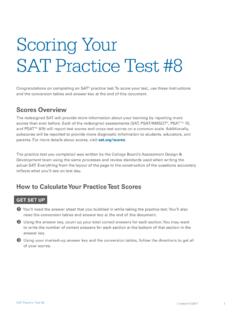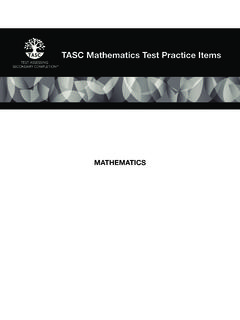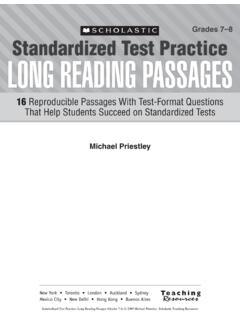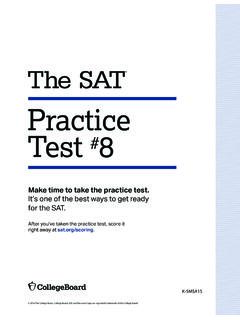Transcription of Answer Explanations SAT Practice Test #8
1 Answer ExplanationsSAT Practice Test #8 Section 1: Reading TestQUESTION 1 Choice A is the best Answer . The first paragraph explains the narrator s love of reading: Even then my only friends were made of paper and ink.. Where my school friends saw notches of ink on incomprehensible pages, I saw light, streets, and people. The fourth paragraph reiterates this love in its description of the bookshop as a sanctuary and refuge. The shift in focus occurs in the last six paragraphs, which recount the gift of a book that transforms the narrator s love of reading into a desire to write: I did not think there could be a better [book] in the whole world and I was beginning to suspect that Mr.
2 Dickens had written it just for me. Soon I was convinced that I didn t want to do anything else in life but learn to do what Mr. Dickens had done. Thus the passage s overall focus shifts from the narrator s love of reading to a specific incident that influences his decision to become a B is incorrect because the passage never focuses on the narrator s father, who primarily serves to illustrate the narrator s determination to read books despite all obstacles. Choice C is incorrect because the passage focuses on the narrator s desire to write rather than on whatever skill he may have as a writer. Choice D is incorrect because the passage doesn t make the narrator s childhood hardships its central focus or analyze the effects of those 2 Choice C is the best Answer .
3 In the first paragraph, the third sentence describes the narrator s love of reading ( where my school friends saw notches of ink on incomprehensible pages, I saw light, streets, and people ), and the fourth sentence describes the role that reading played in the narrator s life ( a safe haven from that home, those streets, and those troubled days in which even I could sense that only a limited fortune awaited me ). The remainder of the passage recounts incidents in which the narrator s actions arise from his love of, and dependence on, reading. Thus the third and fourth sentences can be seen as describing a passion that accounts for those actions.
4 2017 The College Board. College Board and SAT are registered trademarks of the College A is incorrect because although the narrator s school friends are mentioned in passing in the third sentence, they aren t introduced as proper characters and make no further appearance in the passage. Choice B is incorrect because the passage doesn t list the difficult conditions of the narrator s childhood until after these sentences. Choice D is incorrect because the narrator s aspirations aren t discussed until the last paragraph of the 3 Choice C is the best Answer . The tenth paragraph shows that upon returning home, the narrator hides the gift (the new friend ) that Sempere had given him: That afternoon I took my new friend home, hidden under my clothes so that my father wouldn t see it.
5 It can be inferred from this sentence that the narrator s concern arises from an awareness that his father would disapprove of the A is incorrect because although the passage discusses the father s hostility toward the narrator s love of reading, there is no indication that the father is not affectionate to the narrator more generally; indeed, the third paragraph depicts the father s generosity toward the narrator. Choice B is incorrect because the father s generosity toward the narrator, as depicted in the third paragraph, clearly shows that the father encourages unnecessary purchases of such things as candy.
6 Choice D is incorrect because although the first paragraph shows that the father is hostile toward books in general, there is no indication in the passage that Dickens or any other author is a specific object of the father s 4 Choice D is the best Answer . The previous question asks which statement about the narrator s father would the narrator most likely agree with. The Answer , that his father wouldn t have approved of Sempere s gift to the narrator, is best supported in the tenth paragraph: That afternoon I took my new friend home, hidden under my clothes so that my father wouldn t see it. It can be inferred from this sentence that the narrator is aware of his father s likely disapproval of the gift (the new friend ).
7 Choices A, B, and C are incorrect because the cited lines don t support the Answer to the previous question. Instead, they show the father giving his own gift to the narrator (choice A) and illustrate how the narrator was treated when in Sempere s bookshop (choices B and C).QUESTION 5 Choice A is the best Answer . The last paragraph makes clear the narrator s enthusiasm for Charles Dickens s Great Expectations, and it can be inferred from the last sentence of this paragraph that this enthusiasm motivated the narrator to aspire to a career as a writer: Soon I was convinced that I didn t want to do anything else in life but learn to do what Mr.
8 Dickens had done. Answer Explanations | SAT Practice Test #8 Choice B is incorrect because the passage doesn t discuss gifts the narrator has received in the past; although the father sometimes gave the narrator money to buy sweets and snacks, these weren t gifts since the narrator made the purchases himself. Choice C is incorrect because although it is clear from the passage that Sempere was kind and even indulgent to the narrator, there is no suggestion that this treatment was inspired by respect for the narrator. Choice D is incorrect because there is no suggestion that the narrator took Sempere s figurative designation of Dickens as a lifelong friend in the ninth paragraph to be a literal 6 Choice D is the best Answer .
9 The previous question asks why the narrator considers Great Expectations to be the greatest gift he ever received. The Answer , that the book convinced him to become a writer, is best supported by the last sentence of the last paragraph: Soon I was convinced that I didn t want to do anything else in life but learn to do what Mr. Dickens had done. Choices A, B, and C are incorrect because the cited lines don t support the Answer to the previous question. Instead, they explain the narrator s interactions with the bookseller (choice A), describe the book s physical condition (choice B), and indicate the narrator s initial, erroneous assumption that Sempere knew Charles Dickens personally (choice C).
10 QUESTION 7 Choice D is the best Answer . In the fourth paragraph, the narrator explains that although Sempere normally didn t charge him for books, he still left Sempere a few coins as payment: It was only small change if I d had to buy a book with that pittance, I would probably have been able to afford only a booklet of cigarette papers. These lines signal the narrator s awareness that he was paying less for the books than they were A is incorrect because the passage states that Sempere didn t expect or want the narrator to pay: He hardly ever allowed me to pay for the books. Choice B is incorrect because the fourth paragraph makes clear that even if Sempere didn t want the narrator's money, the narrator would still leave the coins I d managed to collect.







